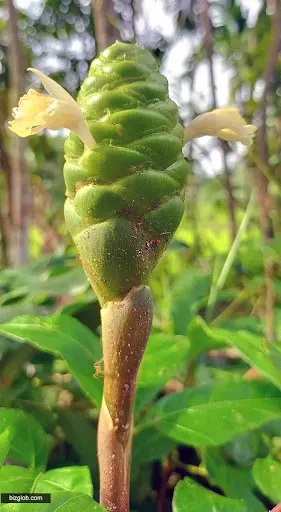Bitter ginger (Zingiber zerumbet) is a plant species from the family of ginger, originates from Asia but can be found in many tropical countries.
Pinecone ginger / Bitter ginger
Zingiber zerumbet, Awapuhi or Bitter ginger: Plant Details, Images, Medicinal Benefits and Uses
Bitter ginger (Zingiber zerumbet) is a plant species from the family of ginger, with leafy stems that can grow up to about 1.2 m (3.9 ft) tall. The plant originates from the Asia continent but can be found in many tropical countries.
Awapuhi Plant, wild ginger
Kingdom: Plantae
Family: Zingiberaceae
Genus: Zingiber
Species: Z. zerumbet
The plant is also known by other names include: Awapuhi, Wild ginger, Bitter ginger, Shampoo ginger, and Pinecone ginger, In Malayalam, the plant is known as കോലിഞ്ചി (Kolinchi), കാട്ടിഞ്ചി (Kattinchi), മലയിഞ്ചി (Malayinchi). Its rhizomes have been used in the manufacturing of food flavouring and appetizers in various cuisines while the rhizome extracts have been used in herbal medicine.
Shampoo ginger, Pinecone ginger
According to Tropical Self Sufficiency, The shoots, rhizomes and inflorescence liquid are all consumable. The rhizome has traditionally been used in medicinal applications as an anti-inflammatory, anti-diarrheal, de-wormer, and for various types of pain management. The liquid from the inflorescence is drinkable.
Zingiber zerumbet, Bitter ginger
Medicinal Benefits: Awapuhi or Zingiber zerumbet is used for headaches, toothache, ringworm, and other skin diseases such as sore spots, bruises and cuts, achy joints/sprains, as it is said to have anti-inflammatory properties, the plant is used for stomach-aches.
Bitter ginger, Shampoo ginger
According to Wikipedia, The most common use of the plant awapuhi is as a shampoo and conditioner. It can also also be used as a massage lubricant. The leaves and leaf stalks, which are also fragrant, were used in baking in the imu, underground oven, to enhance the flavor of pork and fish as they cooked.









